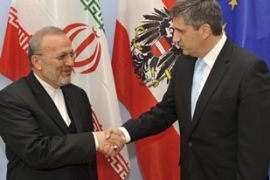Iran ‘remains open’ to nuclear swap
Iranian foreign minister discusses fuel proposal with head of UN nuclear agency.

But it has run into deadlock after Tehran called for a simultaneous exchange of nuclear fuel to take place within its borders.
A spokeswoman for the IAEA confirmed that Mottaki and Amano had discussed the fuel deal and “exchanged views on the possible modalities for its realisation”.
Restoring confidence
Mottaki also held talks with his Austrian counterpart, Michael Spindelegger, amid efforts to halt a new round of sanctions against Tehran over its disputed nuclear programme.
| in depth | |||||||||||||||||
|
But Spindelegger said the onus is on Iran to defuse international tensions, and he called on Tehran to co-operate with the international community or face sanctions.
“The movement toward sanctions can be stopped only if there is real movement [by Tehran]”, Spindelegger said.
“We are awaiting … proposals from the Iranian side that will restore confidence.”
Iran says that it is entitled to continue work on its controversial uranium enrichment programme while a signatory to the nuclear Non-Proliferation Treaty (NPT) and strongly denies it wants nuclear weapons.
Iran’s diplomatic efforts came as its elite Revolutionary Guard test-fired five missiles as part of ongoing military exercises in the strategic Strait of Hormuz.
The shore-to-sea and sea-to-sea missiles struck a single target simultaneously, state television reported.
Massoud Jazayeri, the Revolutionary Guard commander, said the exercises were part of Iran’s deterrence plane to make its enemies “regretful” if they launch any attack against the country, the official IRNA news agency reported.
He also called on foreign forces to leave the region, in an apparent reference to the presence of US troops in neighbouring Iraq, Afghanistan and the Gulf region.
“Those who came from [far away] to our region must leave, because we consider them as the enemy,” he said.
Iran stages regular military manoeuvres in strategic Gulf waters, showcasing its long- and medium-range missiles as well as other weaponry.

